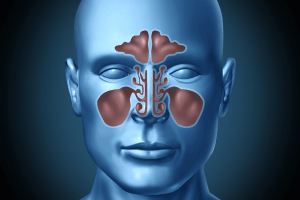Sinus pain is something everyone experiences at one point or another in their lifetime. It’s easy to mistake nagging pain in your forehead, cheekbones, and bridge of your nose as signs of COVID or a mild sinus infection. While these symptoms often resolve with a little time and over-the-counter care and in some cases medication, if they’re due to a sinus infection, a trip to a sinus specialist is warranted. It’s important for you to understand what sinus pain is so you can avoid weeks of discomfort and potential complications.
What Causes Sinus Pain?
Sinuses are air-filled spaces in your skull connected to your nasal passages. They can become inflamed due to infections, allergies, or even changes in atmospheric pressure. The inflammation blocks the sinus, trapping air and mucus, which then causes pressure and pain.
Common triggers include:
- Infections: Bacterial, viral, or even fungal infections can lead to sinusitis, causing inflammation and blockage.
- Allergies: Pollen, dust mites, pet dander, or mold can irritate the sinuses, leading to allergic rhinitis and subsequent sinus pain.
- Irritants: Smoke, pollution, or chemical fumes can inflame the sinuses.
- Atmospheric changes: Rapid weather changes or flying can cause sudden sinus pressure changes, leading to pain.
Sinus pain is also commonly associated with infections, allergies, and inflammation. However, several less common causes can also result in sinus pain. Here are some of them:
- Barotrauma: This refers to injuries caused by increased air or water pressure, such as what one might experience when diving or flying.
- Fungal Sinusitis: While bacterial and viral sinus infections are more common, fungi can also invade the sinuses, especially in individuals with compromised immune systems or those living in certain environmental conditions.
- Nasal Polyps: These non-cancerous growths in the nasal passages or sinuses can block the sinus passages, leading to pain.
- Tooth Infection: An infected tooth or abscess can cause referred pain in the sinuses, especially if the infection is in the upper back teeth.
- Temporomandibular Joint Disorders (TMJ): Problems with the jaw joint can sometimes cause referred pain in the sinus area.
- Migraine: Some individuals can experience sinus-like pain during migraines.
- Osteomyelitis: This is an infection of the bone or bone marrow. If it occurs in the bones of the face, it can mimic sinus pain.
- Tumor: Though rare, tumors in the sinus or nasal passage (benign or malignant) can cause pain.
- Cystic Fibrosis: This genetic disorder can lead to the buildup of thick, sticky mucus in the sinuses, resulting in pain.
- Sarcoidosis: This disease causes clusters of inflammatory cells to grow in the body, including the sinuses, leading to pain.
- Vasculitis: Inflammation of the blood vessels can affect the sinuses, resulting in pain.
- Foreign Body in the Nose: Especially seen in children, small objects stuck in the nose can cause pain and infection.
- Overuse of Nasal Sprays: Over-reliance on certain over-the-counter nasal decongestant sprays can lead to a rebound effect, causing more congestion and pain.
- Gastroesophageal Reflux Disease (GERD): Though it primarily affects the stomach and esophagus, GERD can cause stomach acid to flow back into the throat and possibly the sinuses, causing irritation and pain.
It’s crucial to get an accurate diagnosis when experiencing persistent or severe sinus pain. If the common causes are ruled out, it’s time to consult with an ENT doctor who specializes in sinus treatments to explore some of these less common causes.
Temporary Sinus Pain vs. Persistent Sinus Pain

However, if the pain persists for more than a week or recurs frequently, it’s a sign that something more serious might be at play. Persistent sinus pain can be indicative of:
– Chronic sinusitis: This condition means your sinuses remain inflamed and swollen for over 12 weeks, despite treatment attempts.
– Nasal polyps or tumors: Growth in the sinuses can cause persistent pain and should be investigated.
– Deviated nasal septum: The wall between your nostrils can deviate and block sinus passages, leading to chronic pain.
When to Seek Professional Care for Sinus Pain
- Duration: If sinus pain lasts over a week, despite home remedies and over-the-counter medications, it’s time to see a doctor.
- Intensity: Intense pain, especially localized to one area, could be a sign of a blockage or growth that needs professional attention.
- Accompanying Symptoms: Fever, fatigue, dental pain, or a persistent cough can indicate an infection or another underlying issue.
- Visual Signs: Swelling around the eyes, a forehead rash, or yellow/green nasal discharge is reason for concern.
- Recurrent Episodes: If you’re experiencing sinus pain multiple times a year, it’s worth consulting an ENT specialist.
The Path Forward
Once you decide to seek professional care, the doctor will likely start with a physical examination. They may order imaging tests, like an X-ray or MRI, to get a detailed view of your sinuses. Depending on the diagnosis, treatment can range from prescription medications to surgery for severe cases.
Sinus surgery has come a long way and is now minimally invasive in many cases. Procedures like balloon sinuplasty can help restore normal sinus function with minimal discomfort and downtime.
Conclusion
Sinus pain might seem trivial, but it can significantly impact daily life. Persistent pain shouldn’t be ignored, as it can be a sign of underlying issues that need treatment. Always remember, enduring the pain isn’t a testament to strength. Taking proactive steps, understanding your body’s signals, and seeking timely care is the key to wellness. Don’t let sinus pain linger; give your health the priority it deserves.

